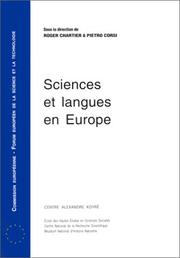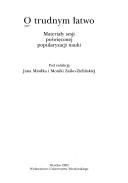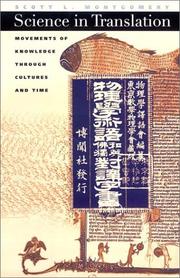| Listing 1 - 10 of 16 | << page >> |
Sort by
|

ISBN: 2713212065 9782713212062 Year: 1996 Publisher: Paris: École des hautes études en sciences sociales,
Abstract | Keywords | Export | Availability | Bookmark
 Loading...
Loading...Choose an application
- Reference Manager
- EndNote
- RefWorks (Direct export to RefWorks)
Science --- Language, Universal. --- Language --- Congresses --- Europe --- Languages --- History --- Language [Universal ] --- Science - Language - Congresses --- Language, Universal. - Congresses --- Europe - Languages - History - Congresses --- Jargon (terminology) --- Langage scientifique --- Language, Universal --- Congresses.
Book
ISBN: 204010657X 9782040106577 Year: 1980 Publisher: Paris: Gauthier-Villars,
Abstract | Keywords | Export | Availability | Bookmark
 Loading...
Loading...Choose an application
- Reference Manager
- EndNote
- RefWorks (Direct export to RefWorks)
English language --- Science --- Technical English --- Language --- Anglais (langue) --- Sciences --- Terminology. --- Langage scientifique et technique --- Terminologie --- Anglais (Langue) --- Anglais technique --- Langage --- Terminologie. --- English language - Technical English --- Science - Language
Book
ISBN: 1785289381 9781785289385 9781785281372 1785281372 9781785281372 Year: 2016 Publisher: Birmingham : Packt Publishing,
Abstract | Keywords | Export | Availability | Bookmark
 Loading...
Loading...Choose an application
- Reference Manager
- EndNote
- RefWorks (Direct export to RefWorks)
Leverage the power of Scala with different tools to build scalable, robust data science applications About This Book A complete guide for scalable data science solutions, from data ingestion to data visualization Deploy horizontally scalable data processing pipelines and take advantage of web frameworks to build engaging visualizations Build functional, type-safe routines to interact with relational and NoSQL databases with the help of tutorials and examples provided Who This Book Is For If you are a Scala developer or data scientist, or if you want to enter the field of data science, then this book will give you all the tools you need to implement data science solutions. What You Will Learn Transform and filter tabular data to extract features for machine learning Implement your own algorithms or take advantage of MLLib's extensive suite of models to build distributed machine learning pipelines Read, transform, and write data to both SQL and NoSQL databases in a functional manner Write robust routines to query web APIs Read data from web APIs such as the GitHub or Twitter API Use Scala to interact with MongoDB, which offers high performance and helps to store large data sets with uncertain query requirements Create Scala web applications that couple with JavaScript libraries such as D3 to create compelling interactive visualizations Deploy scalable parallel applications using Apache Spark, loading data from HDFS or Hive In Detail Scala is a multi-paradigm programming language (it supports both object-oriented and functional programming) and scripting language used to build applications for the JVM. Languages such as R, Python, Java, and so on are mostly used for data science. It is particularly good at analyzing large sets of data without any significant impact on performance and thus Scala is being adopted by many developers and data scientists. Data scientists might be aware that building applications that are truly scalable is hard. Scala, with its powerful functional libraries for interacting with databases and building scalable frameworks will give you the tools to construct robust data pipelines. This book will introduce you to the libraries for ingesting, storing, manipulating, processing, and visualizing data in Scala. Packed with real-world examples and interesting data sets, this book will teach you to ingest data from flat files and web APIs and store it in a SQL or NoSQL database. It will show you how to design scalable architectu...

ISSN: 02396661 ISBN: 8322922841 9788322922842 Year: 2002 Volume: 2444 Publisher: Wrocław: Wydawnictwo uniwersytetu Wrocławskiego,
Abstract | Keywords | Export | Availability | Bookmark
 Loading...
Loading...Choose an application
- Reference Manager
- EndNote
- RefWorks (Direct export to RefWorks)
Polish language --- Science --- Style --- Language --- -Science --- -Natural science --- Science of science --- Sciences --- Polnisch language --- Polski language --- Lechitic languages --- Kashubian language --- -Style --- Natural science --- Natural sciences --- Polish language - Style - Congresses. --- Science - Language - Congresses.
Book
ISBN: 3631558791 9783631558799 Year: 2006 Volume: 67 67 Publisher: Frankfurt am Main: Lang,
Abstract | Keywords | Export | Availability | Bookmark
 Loading...
Loading...Choose an application
- Reference Manager
- EndNote
- RefWorks (Direct export to RefWorks)
German language --- Sociolinguistics --- Science --- Boycotts --- Political aspects --- International cooperation --- Language --- History --- Technical German --- Boycott --- Consumer boycotts --- Secondary boycotts --- Consumer behavior --- Passive resistance --- Natural science --- Science of science --- Sciences --- International cooperation in science --- Scientific German --- Technology --- Natural sciences --- Science - Political aspects - Europe --- Science - International cooperation --- Science - Language - History - 20th century --- German language - Political aspects --- German language - Technical German --- Boycotts - Europe - History - 20th century
Book
ISBN: 940070142X 9786612995880 9400701438 128299588X Year: 2010 Publisher: Dordrecht ; New York : Springer,
Abstract | Keywords | Export | Availability | Bookmark
 Loading...
Loading...Choose an application
- Reference Manager
- EndNote
- RefWorks (Direct export to RefWorks)
This volume critically reexamines Otto Neurath’s conception of the unity of science. Some of the leading scholars of Neurath’s work, along with many prominent philosophers of science critically examine his place in the history of philosophy of science and evaluate the relevance of his work for contemporary debates concerning the unity of science.
Neurath, Otto, 1882-1945. --- Science -- Language. --- Science -- Methodology. --- Science -- Philosophy. --- Philosophy & Religion --- Philosophy --- Science --- Philosophy. --- Neurath, Otto, --- History. --- Philosophy and science. --- Philosophy of Science. --- History of Science. --- History of Philosophy. --- Normal science --- Philosophy of science --- Philosophy (General). --- Annals --- Auxiliary sciences of history --- Mental philosophy --- Humanities --- Science and philosophy

ISBN: 0226534812 0226534804 9780226534800 Year: 2000 Publisher: Chicago: University of Chicago press,
Abstract | Keywords | Export | Availability | Bookmark
 Loading...
Loading...Choose an application
- Reference Manager
- EndNote
- RefWorks (Direct export to RefWorks)
Taal in de wetenschappen --- -Literatuur. Algemene literatuurwetenschap--?.035 --- Taal in de wetenschappen. --- Science --- 82.035 --- 82.035 Literatuur. Algemene literatuurwetenschap--?.035 --- Literatuur. Algemene literatuurwetenschap--?.035 --- Natural science --- Science of science --- Sciences --- Language --- Translating&delete& --- History --- Translating --- Wetenschappen --- Language. --- History. --- vertalen. --- Traduction --- Histoire --- Langage --- Natural sciences --- Science - Translating - History --- Science - Language

ISBN: 2711614174 9782711614172 Year: 1999 Publisher: Paris: Vrin,
Abstract | Keywords | Export | Availability | Bookmark
 Loading...
Loading...Choose an application
- Reference Manager
- EndNote
- RefWorks (Direct export to RefWorks)
Philosophy, Medieval --- Language and languages --- Philosophie médiévale --- Langage et langues --- Congresses --- Philosophy --- History --- Congrès --- Philosophie --- Histoire --- Abelard, Peter, --- Congresses. --- Translating and interpreting --- Philology --- Science --- Language --- -Philosophy, Medieval --- -Translating and interpreting --- -Interpretation and translation --- Interpreting and translating --- Literature --- Translation and interpretation --- Translators --- Natural science --- Science of science --- Sciences --- Medieval philosophy --- Scholasticism --- Translating --- -History --- Philosophie médiévale --- Congrès --- Interpretation and translation --- Natural sciences --- Translating and interpreting - History - Congresses. --- Philology - History - Congresses. --- Science - Language - Congresses. --- Philosophy, Medieval - Congresses.
Book
ISBN: 0822303477 9780822303473 Year: 1976 Publisher: Durham (N.C.): Duke university press,
Abstract | Keywords | Export | Availability | Bookmark
 Loading...
Loading...Choose an application
- Reference Manager
- EndNote
- RefWorks (Direct export to RefWorks)
Language and languages --- Science --- Metaphor --- Religion and science --- Religious aspects --- Language --- 21*015 --- -Metaphor --- -Natural science --- Science of science --- Sciences --- Christianity and science --- Geology --- Geology and religion --- Science and religion --- Parabole --- Figures of speech --- Reification --- Foreign languages --- Languages --- Anthropology --- Communication --- Ethnology --- Information theory --- Meaning (Psychology) --- Philology --- Linguistics --- Theologie en taal --- -Theologie en taal --- 21*015 Theologie en taal --- -Christianity and science --- Natural science --- Religion and language --- Language and languages - Religious aspects --- Science - Language
Book
ISBN: 3484311053 9783484311053 Year: 1990 Volume: 105 Publisher: Tübingen: Niemeyer,
Abstract | Keywords | Export | Availability | Bookmark
 Loading...
Loading...Choose an application
- Reference Manager
- EndNote
- RefWorks (Direct export to RefWorks)
Science --- German language --- Terminology. --- Language. --- Terms and phrases. --- Word formation. --- 803.0-3 --- -German language --- -Science --- -Natural science --- Science of science --- Sciences --- Ashkenazic German language --- Hochdeutsch --- Judaeo-German language (German) --- Judendeutsch language --- Judeo-German language (German) --- Jüdisch-Deutsch language --- Jüdischdeutsch language --- Germanic languages --- Duits: lexicografie --- Terms and phrases --- Word formation --- Language --- Terminology --- -Duits: lexicografie --- 803.0-3 Duits: lexicografie --- -803.0-3 Duits: lexicografie --- Natural science --- Science - Terminology. --- Science - Language. --- German language - Terms and phrases. --- German language - Word formation.
| Listing 1 - 10 of 16 | << page >> |
Sort by
|

 Search
Search Feedback
Feedback About UniCat
About UniCat  Help
Help News
News